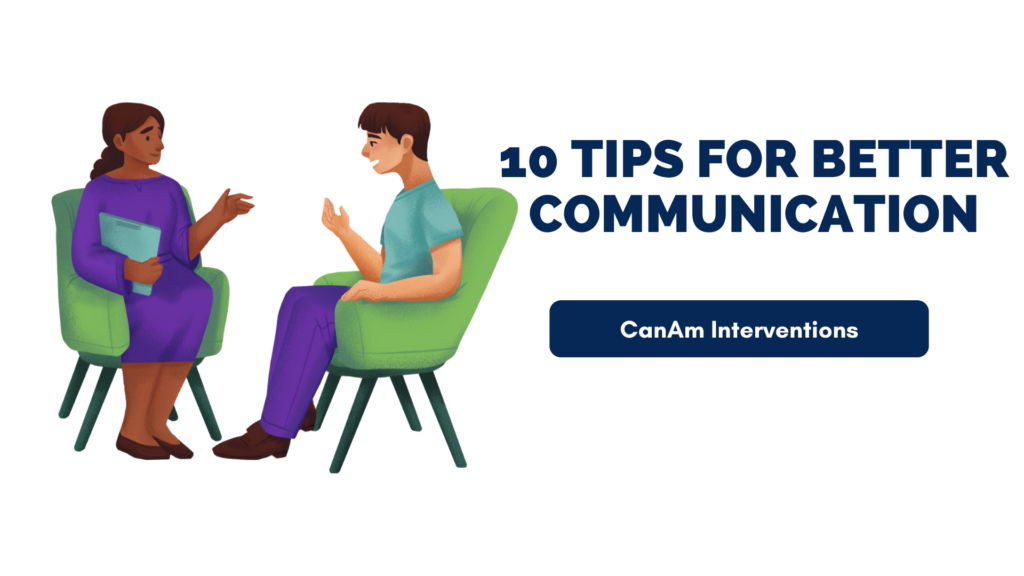Communication makes up most of the way we express ourselves to everyone around us including our families, our friends, our co-workers and even people we don’t know or talk with very much (e.g. people standing in line, mail person, bus driver…). These are all people that make up the encounters we experience in daily life. Navigating these relationships with respect, understanding, compromise, open-mindedness, and willingness are a very important part of life and very important to maintaining healthy relationships.
Listed below are some methods that Can-Am Interventions would like to share with you to bring awareness about the importance of communication, and some helpful suggestions to get you started:

- Listen, listen, and listen. People want to know that they are being heard. Really listen to what the other person is saying, instead of formulating your response. Ask for clarification to avoid misunderstandings. At that moment, the person speaking to you should be the most important person in your life. Another important point is to have one conversation at a time. This means that if you are speaking to someone on the phone, do not respond to an email, or send a text at the same time. The other person will know that they don’t have your undivided attention.
- Who you are talking to matters. It is okay to use acronyms and informal language when you are communicating with a buddy, but if you are emailing or texting your boss, “Hey,” “TTYL” or any informal language, has no place in your message. You cannot assume that the other person knows what the acronym means. Some acronyms have different meanings to different people, do you want to be misunderstood? Effective communicators target their message based on who they are speaking to, so try to keep the other person in mind, when you are trying to get your message across.
- Body language matters. This is important for face-to-face meetings and video conferencing. Make sure that you appear accessible, so have open body language. This means that you should not cross your arms. And keep eye contact so that the other person knows that you are paying attention.
- Check your message before you hit send. Spell and grammar checkers are lifesavers, but they are not foolproof. Double check what you have written, to make sure that your words are communicating the intended message.
- Be brief, yet specific. For written and verbal communication, practice being brief yet specific enough, that you provide enough information for the other person to understand what you are trying to say. And if you are responding to an email, make sure that you read the entire email before crafting your response. With enough practice, you will learn not to ramble, or give way too much information.
- Write things down. Take notes while you are talking to another person or when you are in a meeting, and do not rely on your memory. Send a follow-up email to make sure that you understand what was being said during the conversation.
- Sometimes it’s better to pick up the phone. If you find that you have a lot to say, instead of sending an email, call the person instead. Email is great, but sometimes it is easier to communicate what you have to say verbally.
- Think before you speak. Always pause before you speak, not saying the first thing that comes to mind. Take a moment and pay close attention to what you say and how you say it. This one habit will allow you to avoid embarrassments.
- Treat everyone equally. Do not talk down to anyone, treating everyone with respect. Treat others as your equal.
- Maintain a positive attitude and smile. Even when you are speaking on the phone, smile because your positive attitude will shine through, and the other person will know it. When you smile often and exude a positive attitude, people will respond positively to you.
Becoming a better communicator will benefit everyone. Many times, when communicating with another person, much patience is required. Often when people are communicating, very rarely do both those people have the same skill level of communication.There are many possible reasons for this, but the most important part is being aware of this inevitable situation. We may learn to communicate better, but it may take time for others to see that growth within you. We may think that we are good communicators because we have good intentions and may not think clearly about what we’re saying. But if we can be aware of how we listen and what we say, and when and how we say it, we can then reach a higher level of communication that will benefit everyone involved which in turn will strengthen those relationships. Many times, professional help is needed to navigate through complicated matters that tend to be more sophisticated. Can-Am is here to offer answers and support, and to help individuals receive the treatment they deserve. Help is one phone call away.
E: patti.pike@canaminterventions.com W: www.canaminterventions.com
1-800-638-1812 Toll Free Internationally
415-827-3725 Cell /Text
415-578-2875 Office